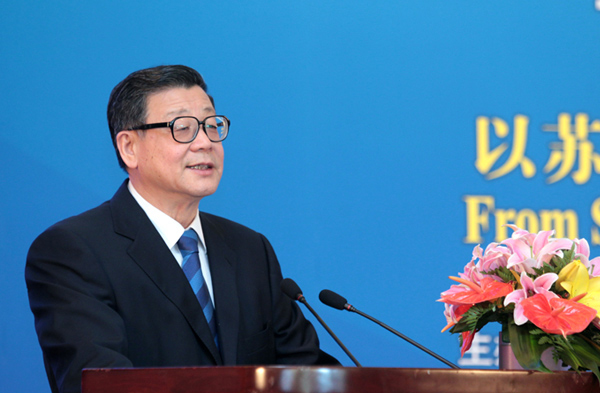Think tank network builds closer ties to Central, Eastern Europe

Wang Weiguang, president of the Chinese Academy of Social Sciences, delivers a keynote speech at the third High-Level Think Tanks Symposium of China and Central and Eastern European Countries.
On Dec. 16, the China-CEEC think tank website, http://www.16plus1-thinktank.com/, was launched in Beijing on the sidelines of the third High-Level Think Tanks Symposium of China and Central and Eastern European Countries (CEEC).
The 16-Plus-One Think Tank Network is an echo of Chinese Premier Li Keqiang’s proposal of a network to encourage more interaction among scholars of the two sides during the third China-CEEC Summit in Belgrade in December 2014. The network will serve as a platform for international coordination and high-level exchanges among think tanks from China and CEE countries through project cooperation, dialogue and field study. It is also the first center for exchange and cooperation between China and CEE countries. It will serve the 16-plus-one mechanism through the power of think-tank cooperation.
Cai Fang, vice-president of the Chinese Academy of Social Sciences (CASS) and Liu Haixing, director-general of the Foreign Ministry’s Department of European Affairs, officially launched the network as CASS President Wang Weiguang and former Romanian Prime Minister Victor Ponta watched.
Wang Weiguang said in his keynote speech that he was optimistic about future exchanges and cooperation between think tanks. In the next five years, CASS will lend its full support to this partnership, Wang said. He said he expected the newly established network to serve as a platform for international think-tank cooperation between the two sides and become an emblem of 16-plus-one cooperation.
Peng Xiaofeng, chairman of the China World Politics Research Association, said intellectual resources are the most valuable treasures for a country. The Chinese government places a great emphasis on think tank building. To help China-CEE cooperation benefit people from both sides and even the whole world, a new model aimed at substantial cooperation should be formulated to transcend different regions and institutions. Solving emerging problems and adapting to new conditions requires drawing upon collective wisdom. In this process, think tanks play a significant role. It is the right time for building such a cooperation network, he said.
In addition to the role of think tanks in promoting 16-plus-one cooperation, participants also carried out heated discussions on strengthening connection and communication between the two sides under the “Belt and Road” strategy, how to advance cooperation in other fields within the 16-plus-one mechanism, how to use the network to further boost think-tank cooperation, and other topics.
Grzegorz Kolodko, former deputy prime minister and finance minister of Poland, expressed his optimism about China’s future development. Kolodko, an economist specializing in Chinese economic issues, said China is a great country that would raise proper questions at a proper time. The shift from a manufacturing economy to an innovative economy as well as the transition from a domestically oriented economy to a more open one, are both questions posed at right time, Kolodko said. Therefore, he said he was convinced that the 16-plus-one cooperation will allow the 500 million people from countries covered by the framework to enjoy even faster development than developed countries.
The event gathered more than 200 participants, including experts and scholars from think tanks, research institutions, ministries and commissions in China and CEE countries. It was also attended by former politicians from CEE countries and personnel from embassies in China from these countries.
The event was hosted by CASS, the Secretariat for Cooperation between China and Central and Eastern European Countries, and the China Foundation for International Studies.
Deng Zhimei is a reporter at the Chinese Social Sciences Today.

 PRINT
PRINT CLOSE
CLOSE